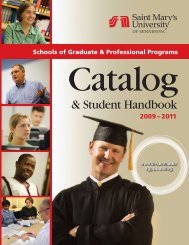PDF version - Saint Mary's University of Minnesota
PDF version - Saint Mary's University of Minnesota
PDF version - Saint Mary's University of Minnesota
You also want an ePaper? Increase the reach of your titles
YUMPU automatically turns print PDFs into web optimized ePapers that Google loves.
Mathematics and Statistics<br />
college trigonometry. Prerequisite: mathematics competency satisfied.<br />
M149 Calculus with Precalculus II 4 credits<br />
This course completes the two-semester sequence that begins with M148, and together with M148<br />
provides a two-semester sequence that covers the material <strong>of</strong> a traditional Calculus I course along with<br />
built-in coverage <strong>of</strong> precalculus topics. Topics in M149 include: trigonometric and inverse trigonometric<br />
functions, rules for derivatives, applications <strong>of</strong> derivatives, and definite and indefinite integrals. Credit is<br />
not granted for this course and M151. Prerequisite: M148.<br />
M151 Calculus I 4 credits<br />
This course provides an introduction to the differential and integral calculus. Topics include:<br />
the concepts <strong>of</strong> function, limit, continuity, derivative, definite and indefinite integrals, and an<br />
introduction to transcendental functions. Credit is not granted for this course and M148 and<br />
M149. Prerequisites: departmental placement or courses equivalent to college algebra and college<br />
trigonometry.<br />
M152 Calculus II 4 credits<br />
This course is a continuation <strong>of</strong> M151. Some <strong>of</strong> the topics <strong>of</strong> M151 are revisited at a higher<br />
mathematical level. Topics include: limits, differentiation, applications <strong>of</strong> the definite integral,<br />
inverse trigonometric functions, techniques <strong>of</strong> integration, improper integrals, indeterminate forms,<br />
numerical methods for integration and approximation, curves in the plane given parametrically, polar<br />
coordinates, and vectors in 2-space and 3-space. Prerequisite: Minimum grade <strong>of</strong> C in either M149 or<br />
M151 or departmental placement.<br />
M251 Calculus III 4 credits<br />
This course continues the development <strong>of</strong> Calculus from M151 and M152. Topics include: sequences and<br />
series, conic sections, and differentiation and integration <strong>of</strong> functions <strong>of</strong> several variables. Offered fall<br />
semester. Prerequisite: Minimum grade <strong>of</strong> C in M152.<br />
M252 Linear Algebra 4 credits<br />
This course provides an introduction to techniques and applications <strong>of</strong> linear algebra. Topics include:<br />
systems <strong>of</strong> linear equations, matrices, determinants, Euclidean n-space, real vector spaces, basis and<br />
dimension, linear transformations, inner products, and eigenvalues and eigenvectors. Offered spring<br />
semester. Prerequisite: Minimum grade <strong>of</strong> C in M152.<br />
M301 Foundations <strong>of</strong> Advanced Mathematics 2 credits<br />
This course looks at topics central to further study in mathematics. Topics include symbolic logic,<br />
especially as it applies to mathematical pro<strong>of</strong>; methods <strong>of</strong> mathematical pro<strong>of</strong> such as direct pro<strong>of</strong>,<br />
indirect pro<strong>of</strong>, pro<strong>of</strong> by induction; use and meaning <strong>of</strong> mathematical quantifies and predicates; sets;<br />
relations; equivalence relations and partitions; order relations; functions and their properties; and<br />
complex numbers. A junior assessment test is administered as part <strong>of</strong> this course. Offered fall semester.<br />
Prerequisite: M251 (may be concurrent).<br />
M310 Combinatorics and Graph Theory 3 credits<br />
This course provides an introduction to combinatorial and graph theoretical techniques in mathematics. It<br />
is also designed for students in computer science. Topics include: sets, functions, combinatorial techniques,<br />
graph theory, searching algorithms, and trees. Prerequisites: CS106 or CS110/111, and M152.<br />
M315 Number Theory 3 credits<br />
This course provides an introduction to elementary number theory. Topics include: divisibility,<br />
prime and composite numbers, congruences, arithmetical functions, primality testing, factorization<br />
techniques, and applications to cryptography. Prerequisite: M152.<br />
133
















